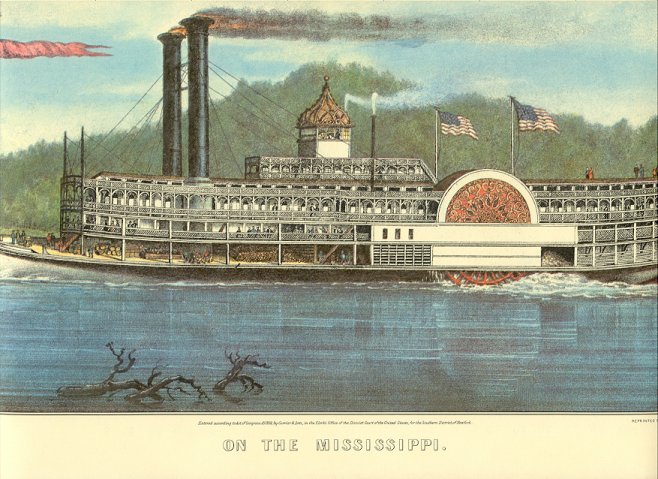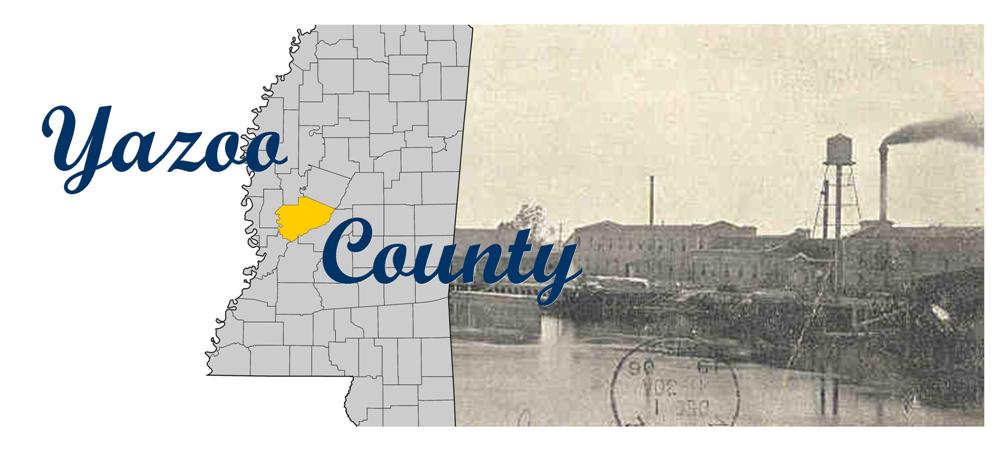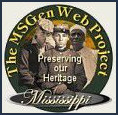 Excerpt of Yazoo's history from the book "A History of Mississippi" |

|
|||||||||||||||||||||||||||||||||||||||||||||||||||||||||||||||||||||||||||||||||||||||||||||||||||||||||||||||||||||||
Excerpt of Yazoo County History from the book "A History of Mississippi"
The early settlers of Yazoo were James H. O'Neal and Martin Friley on O'Neil's creek in 1822; the lands located by these pioneers are now owned by their children. David and Elliott Ragsdale opened plantations where the town of Satartia is now located. A Mr. Hanau settled what is now Yazoo City, and known as Hanau's Bluff until 1829. Governor Hiram G. Runnells, Judge Isaac Caldwell and Daniel W. Wright purchased the land and laid off the town, which was called Manchester until 1838, when it was changed to Yazoo City. The first gin in the county was at Hanau's Bluff, erected in 1826. The first saloon in the county west of Big Black was in this gin-house. Henry and Hiram Hagan settled the Tokeba plantation; Richardson Bowman was a native of Ireland and came to America because of his connection with the Irish revolt of 1798; he first settled at Covington, Louisiana, and married Miss Riley, the daughter of a Revolutionary soldier. He was a soldier in the war of 1812 and at the battle of New Orleans, and was there promoted from the ranks to a first lieutenancy. After the war he removed to Pike county, in this State, and in 1826 to Yazoo, and settled on the table lands of Big Black; there in connection with his planting interests he engaged in merchandising--a man of enterprise, public spirit and a leading Democrat. This pioneer boy from the Emerald Isle accumulated a valuable estate, the lands of which are still owned by his sons and daughters, all of whom are honored and respected; his son, Judge Robert Bowman, of Yazoo City, is widely known as a leading lawyer and among Yazoo's most prominent citizens; S. Collins, Charles Brumfield, the Picketts, Hendrick's, Henry Vaughn, the latter now eighty-four years of age, owns and lives on the land he opened in an early day; James and Thomas Ellison, W.H. Stubblefield, Gid Pepper, James Ball, the Priesters, William P. Gadberry, who donated the lands upon which Benton, the new county site, was located, he was the first probate judge of the county, was probate clerk and the first postmaster, merchant and hotel keeper in Benton; his eldest son, Dr. W.Y. Gadberry, has been for forty years a prominent physician of high reputation, widely known for learning and skill and at one time a medical professor in the city of Louisville, Kentucky; Richard M. Green, who built the first mill in Yazoo county; his son, Dr. J. F. Green, is now a practicing physician of high standing in Yazoo City; Otho Bell, who was the first sheriff of the county, and after the organization of Holmes, was the first sheriff of that county; John Everett, John M. Sharp, a successful planter and member of the Legistlature; Gabriel, Richard and William Swayze, Steven and A. H. Luse, who came from Adams County; their descendants own large tracts of land inherited from their ancestors; John Dowd, James Hart and Doctor Gale, who invested largely in lands on the lower Yazoo; Silver Creek was settled by Robert Morris, Benjamin Roach, Wm. C. Harris, W. R. Hill, John Woolfolk and Wm. Lambreth; John S. Young was the first circuit clerk of the county; Robert S. G. Perkins, Morgan L. Fitch, Algernon Duval and Robert Campbell were among the earliest lawyers; the latter served as probate judge of the county; John Battaile, a lawyer of literary culture; Wm. R. Miles, a Kentuckian by birth, settled in Yazoo to practice his profession, the law; did a large and lucrative practice, is a gentleman of distinguished ability, in politics was a Whig, and forty years or more ago was among the foremost public speakers in the State; a fine story-teller, splendid presence, an unusual magnetism, it was difficult for even a Democrat to vote against Wm. R. Miles, who represented the county in the State Senate and was a Brigadier-General in the Confederate army. Some years ago the venerable General retired to his plantation where he now resides surrounded by every luxury that can add to the comfort of old age. Edward C. wilkinson, a lawyer of recognized ability, was associated in the practice with General Miles, as the senior partner of the firm; he was judge of the circuit court of his district, and at one time a candidate for Judge of the High Court of Errors and Appeals, against Chief Justice W. L. Sharkey. Judge Wilkinson was an uncle of United States Senator E. C. Walthall. R. S. Holt, James R. Burrus and Edward Bowman were lawyers of high standing; the latter of excellent attainments and engaging manners, died at an early age. George W. Dougherty, not a profound lawyer, but bright and quick with infinite humor and jest. Morgan L. Fitch, who read law after settling at Benton, and subsequently was elected circuit judge. Q. D. Gibbs, who came to Mancester, now Yazoo City, in 1834; he was regarded as the best commercial lawyer at the bar, ranked deservedly high in his profession and was a gentleman of the greatest integrity; he represented the county in the Legislature, and for some years prominent in politics. Q.D. Gibbs was also the father of ex-Lieutenant-Governor Barnett Gibbs, of the city of Dallas, Texas, who is one of the leading men of that State, and most kindly remembered by his Mississippi friends. W.E. Pugh, A.G. and S.E. Nye and Geo. B. Wilkinson, were lawyers in Yazoo at an early day. The first newspaper published in the county was the Yazoo Banner, by Philip Duval, a gallant and plucky man. The Yazoo Whig was established by James A. Stevens, in 1832. The first Democratic paper in the county was established by Major Ethel Barksdale, at Yazoo City, in 1845, and called the Yazoo Democrat; it was conducted with signal ability, and made for its editor the reputation of a forcible writer. The physicians in Benton were Dr. J.W. Morough, an Irishman, and a graduate of the University of Dublin, Dr. Ben. Hagerman, Dr. Wilkinson, Dr. Wm. Yandall, Dr. Burton Yandall, Dr. Hiram J. Thomas, Drs. Leake and Barnett, later Drs. Kidd and James, all physicians of high standing and extensive practice. Dr. Kidd was the husband of that gifted and accomplished lady, Mrs. L. A. Kidd, now President of the North Texas Female College, located at the city of Sherman, one of the largest and best equipped schools in the Southern States. There may be also named among the early settlers in the lower end of the county, Samuel Marley, John B. Hall, Jonathan Bonney, Arnold Russell, Dr. Isaac Hamberlin, Dr. Joel C. Rice, Who was the father of the well known physician, Dr. C.A. Rice, Fileding Cook, Wm. Hall, Henry Douglas, and Michael Kennedy, Robert Cage, whose eldest daughter married General Harry T. Hayes, who became an eminent lawyer in New Orleans, and a Confederate soldier with the rank of Brigadier General. General Hayes and his elder brother, Col. Jack Hayes, who will be remember as the Colonel of the celebrated regiment of Texas Rangers, which he commanded with brilliant success in the Mexican war, were natives of Wilkinson county, Mississippi, and reared by their uncles Judge Harry W. and Robert H. Cage. Among the early merchants at Benton were Philip P. Gadberry, T.H. and J.A. Rollins and Robert Jennings. The first merchants in Yazoo City, were B.F. Williams, P.B. Pope, George Jonas, Jas. Robinson and Richard Allen; succeeding these were Fountain Barksdale, now a gentleman of advanced age, widely known and greatly respected, James Allen, Harrison & Hyatt, J.M. Delvin, R.F. Jennings, C.W. Wood, B.F. Bostick and Robt. Wilson; all these gentlemen did an extensive trade. Prior to the construction of the Illinois Central railroad, Yazoo City, was a commercial point of much importance; it was the market for Yazoo, Holmes, Attala, Winston, Madison, Leake and Neshoba counties. There were shipped from the city annually, about sixty thousand bales of cotton. In 1827, an act was passed by the Legistlature for the election of five commissioners to select a permanent seat of justice for the county. The 5th section of the act directed that the town when selected should be called Benton. The county site was subsequently removed to Yazoo City, which now has a population of nearly 5,000 and is among the handsomest and most attractive towns in the State. Satartia, Enola, Benton, Deasonville, Vaughn's Station, Free Run and Zeiglarsville, comprise the other towns in the county. The principal streams are the Yazoo river, which flows one hundred and forty miles through the center of the county, and the Sunflower and Big Black rivers; Wolf Lake, a beautiful sheet of water a few miles northwest of Yazoo City, and Lake George; both of these lakes are navigable during high water. The railroads in the county are the Illinois Central, running north and south, and its branch road from Jackson via Yazoo City to Greenwood. There are 252,692 acres of cleared land; average value of which, as rendeded to the assessor, $8.08 per acre; total value, including incorporated towns $2,954,885 The population as shown by the census report of 1890: whites, 8,515; colored, 27,873; total, 36,388.
Source: Lowry, Robert and McCardle, William H.
A History of Mississippi, from the Discovery of the Great River by Hernando DeSoto, Including the Earliest Settlement Made by the French Under Iberville, to the Death of Jefferson Davis [1541-1889]. Jackson, Miss.: R. H. Henry & Co., 1891. Pages 480-482. |
||||||||||||||||||||||||||||||||||||||||||||||||||||||||||||||||||||||||||||||||||||||||||||||||||||||||||||||||||||||||
|
Home | Contact Us | USGenWeb History
All material provided is copyrighted by the submitter. No commercial use is legal without permission of the/all author(s) |
||||||||||||||||||||||||||||||||||||||||||||||||||||||||||||||||||||||||||||||||||||||||||||||||||||||||||||||||||||||||


